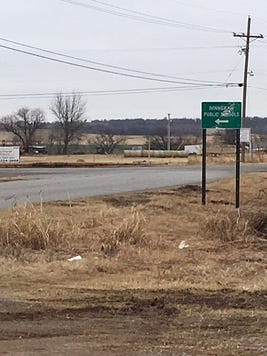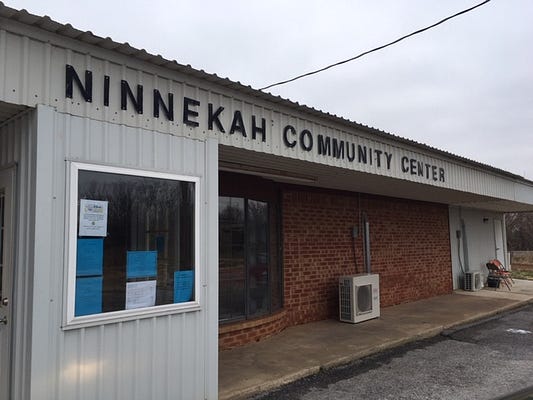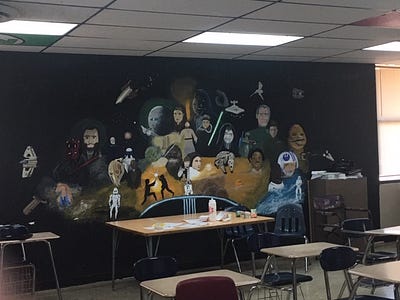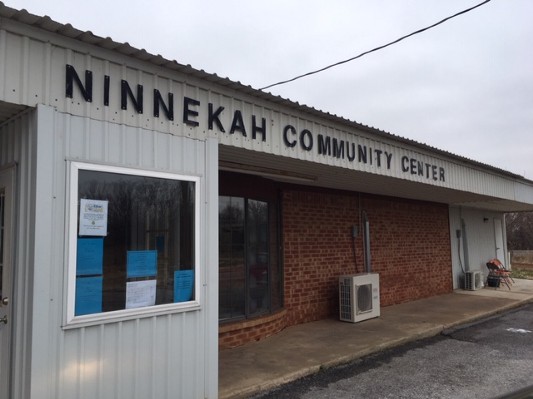By Elizabeth Sidler, Oklahoma Senior Program Associate
Driving south on Old Highway 81 toward Ninnekah, Oklahoma, my colleague and I pass rolling hills, retention ponds, phone line maintenance, and cows. Just a few miles north is a Walmart and a Chinese restaurant, a Walgreens and a university. But here it’s land and homes and people.
While enjoying the pastoral beauty, we talk through the day’s central question: In what ways will an effective civics education benefit these students? Why do these 60 students in a town of 1,000 need a good civics education?
We turn left at the shotgun-peppered “Ninnekah Public Schools” sign and drive 20 mph through the heart of town. Community Center, defunct Game Room, the Shamrock where the old men get together for coffee between 6–6:30, the Baptist church, and the school. On a few acres of hill sit Ninnekah Elementary, Middle, and High School, playground, gym, and baseball field.


One hallway runs through the school in a long oval. We say hello to the school secretary, sign in, fill out our nametags, and head clockwise past the front desk to Coach Chuck Yackeyonny’s classroom.
A tall, quiet man with murals by NHS Art classes of Star Wars and Marvel superheroes on his walls, Coach Yack welcomes us and introduces us to the twenty 10th graders in 2nd hour. They’re hesitant, like all students at the beginning of a new and dubious “action civics” project, but as soon as they start talking about the issues they see in the community and the things they want to improve, they open our eyes to a new civic world.

Common threads through all three Generation Citizen classes at NHS were the need for more economic development — restaurants, a bank branch — and better roads. In the state capital, Oklahoma City, both issues can be handled at the municipal level. But in this city of 1,000, there isn’t a Chamber of Commerce and all of the roads are the responsibility of the county. Students are concerned with hyperlocal issues for which there are not clear municipal government solutions.
The city’s website describes Ninnekah as “a quiet little farming community.” As such the economy can be hard for modern eyes to see, trained as we are by retail. And public institutions are no different. There is a City Hall, and the Mayor and Clerk can be reached by email, but the Grady County Water District #7 maintenance truck that flew by us on Hwy 81 is much more indicative of where the civic action is happening. The students of Ninnekah High School are helping us understand how much most of us don’t know about County Government.
There are 77 counties in Oklahoma, responsible for maintaining everything from roads to health departments, jails to fairgrounds. And in a county like Grady, full of small communities like Ninnekah and households outside of any municipality, county government often fulfills the critical role of filling in gaps between municipalities by providing emergency services either directly or through agreements with nearby cities.
County officials are primarily responsible for maintaining the peace, protecting health and property, and enhancing economic opportunity. Within these broad categories officials 1.) enforce laws, 2.) build and maintain county roads, 3.) maintain official records, 4.) collect, maintain, and disburse county revenues, and 5.) help to ensure the physical health and well-being of county citizens.
But people rarely talk about being “from” a county. They identify with their city and their state. Counties are just administrative subdivisions of the state with no legislative power and the nebulous purpose of maintaining the peace. When one realizes how the peace is kept, it’s all too clear how essential is it to understand and be engaged with county politics.
43,000 people were incarcerated in Oklahoma in 2018, and 13,000 were held in county jails. County Commissioners are required to inspect jails once a year, but the lack of oversight in county government means there are often few checks and balances to ensure those requirements are duly upheld. The living conditions of so many Oklahomans who are in county jails — nearly one-third of whom have not been convicted of a crime — lie with the oversight, decision-making, and investment of county officials.
A town over from Ninnekah in Grady County, a scandal recently broke that a handful of county officials have been overpaid by more than $727,000 since 2008. The state sets salary limits for its employees but the Grady Commissioners began ignoring that cap in 2008 and, in some cases without the knowledge of newly elected or appointed officials, ushered several generations of county officials into the scheme.
Counties have critical responsibilities, which is reason enough to pay more attention to who is elected to County office and how they choose to conduct their affairs, but they are also easy seats of mismanagement or corruption when there aren’t dedicated channels of oversight. Representative government does not work the way it’s supposed to when there are no clear accountability measures between elected and bureaucratic officials and the people they represent. Elevating the profile of county government is good for democracy.
As it stands, the county is one of the least-discussed segments of government. And if county government is responsible for the majority of public services in a town, is it any wonder that people would think it easier or more sensible to have their neighbor help fix the pothole in front of their house than to learn which level of government is responsible for that road and how to contact them and how to persuade them to prioritize their road?
The more time one spends thinking about and interacting with civic life in places like Ninnekah, the more one sees the natural reciprocity between small-town life and the preference for small government. The men getting together for coffee at the Shamrock know each other and know how to lend a hand when things get tough. But as the torn-up Shamrock parking lot proves, even these folks want Grady County work crews to widen and repave Ninnekah’s roads when conditions truly demand it.
Working in Ninnekah is helping us understand that anyone interested in revitalizing the civic life of our country can’t just start talking about effective civics education. We have to begin by seeing, smelling, feeling the context in which these civic skills are going to be used. We have to ask, what does civic life look like here?
